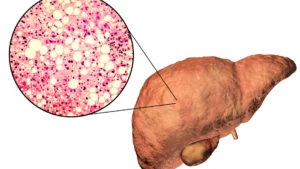What to Know About Life Expectancy with Fatty Liver Disease
Introduction: Fatty liver disease is a condition that is becoming increasingly common in today’s society, largely due to poor diet and sedentary lifestyles. While it may seem like a harmless condition, fatty liver disease can have serious implications for one’s health and life expectancy. Understanding the factors that affect life expectancy, available treatments, preventive measures, and when to seek medical help is crucial for individuals with fatty liver disease.

Life Expectancy
The life expectancy of individuals with fatty liver disease varies significantly depending on several factors. The severity of the disease, presence of complications, and the commitment to making necessary lifestyle changes all play a role in determining life expectancy. In some cases, fatty liver disease can progress to a more severe condition called non-alcoholic steatohepatitis (NASH), which can lead to liver cirrhosis and potentially liver failure. However, it is important to note that not everyone with fatty liver disease will develop these complications.
While it is difficult to predict an exact life expectancy, studies suggest that individuals with NASH-related cirrhosis have a median survival rate of around 12 years. However, with timely detection, lifestyle modifications, and appropriate medical management, it is possible to slow down the progression of the disease and improve life expectancy. Regular monitoring, proper nutrition, exercise, weight loss, and avoidance of alcohol and certain medications can significantly impact the prognosis of fatty liver disease.
Treatment
Treatment options for fatty liver disease primarily target the underlying causes and aim to prevent disease progression. The most effective treatment is lifestyle modification. This includes adopting a healthy diet, increasing physical activity, losing excess weight, and avoiding alcohol. Medications may be prescribed by a healthcare professional to manage specific conditions contributing to fatty liver disease, such as diabetes or high cholesterol. In severe cases, liver transplantation may be necessary for individuals with end-stage liver disease.
Prevention
Prevention is key when it comes to fatty liver disease. Adopting a healthy lifestyle can significantly reduce the risk of developing the condition. This includes eating a balanced diet, maintaining a healthy weight, exercising regularly, and limiting alcohol consumption. Avoiding high-calorie, processed foods and incorporating fruits, vegetables, whole grains, and lean proteins into one’s diet can help prevent the accumulation of fat in the liver. Regular check-ups with a healthcare professional and prompt management of related conditions like diabetes and high cholesterol can also contribute to prevention.
When to See a Doctor
If you experience symptoms such as fatigue, weight loss, abdominal pain, or jaundice, it is crucial to see a doctor promptly. These may be indicators of advanced liver disease. Additionally, individuals with known risk factors such as obesity, diabetes, or a history of alcohol abuse should undergo regular check-ups to monitor their liver health. Early detection and intervention can significantly improve outcomes and life expectancy for those with fatty liver disease.
Summary
Fatty liver disease, if left untreated, can lead to serious complications and impact life expectancy. While the exact life expectancy is difficult to predict, making necessary lifestyle changes and following appropriate medical management can improve outcomes. Treatment primarily involves lifestyle modifications, including a healthy diet, weight loss, and exercise. Prevention is key, and adopting a healthy lifestyle can significantly reduce the risk of developing fatty liver disease. Regular check-ups and early detection are vital for timely intervention and optimal management of the condition.
Sources:
- National Institute of Diabetes and Digestive and Kidney Diseases
- American Liver Foundation
- World Journal of Hepatology
Conclusion: By understanding the factors influencing life expectancy, available treatments, preventive measures, and when to seek medical help, individuals with fatty liver disease can take control of their health. With proactive management and lifestyle changes, it is possible to improve both quality of life and life expectancy. Remember, prevention and early detection are key in combating fatty liver disease.